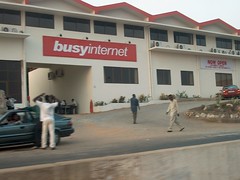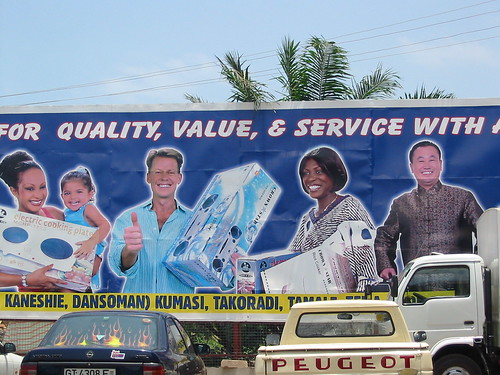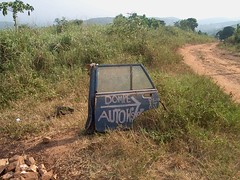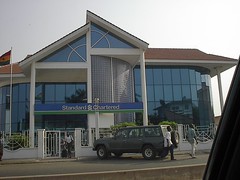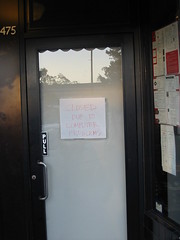On IBM and Africa
So IBM has launched an initiative on innovation and economic development in Africa. Presumably this is a prelude to a potential return to the continent twenty or so years after bailing out. One hopes the results of this brainstorming exercise are reasonable and enough interest is garnered. I even entered a few gnomic bullet points into the 'ThinkPlace' that aggregates ideas on the topic.
I have been asked by many in recent weeks what I think of the matter. Normally I tend to ignore Grand Initiatives ™ since I firmly believe in small things. In this case however, there is is a pleasing intersection with my declared interests: I am an African working at IBM and very publicly concerned with technology, Africa, cultural exchange and development issues.
There are lots of Africans at IBM, and lots of IBMers interested in Africa; the company however has been missing-in-action when it comes to the place. I suppose part of it is that the Africa constituency at IBM has been so diffuse. We are all heads down, minding our business and getting on with things - a head nod or two in corridors or names recognized on email threads. It's also been hard to figure out where and how to start the conversation. As a case in point, I started an Africa 'community' on our intranet just a week ago - apparently the first. When I searched our forums, "Community Central" and the Lotus Connections community portal, I couldn't find any such thing. But such is life, our dark matter warps the world in our quiet and informal way. Even better, there's now a forum and opportunity for such things to coalesce. Baby steps.
So: innovation and economic development in Africa. To my mind it's a matter of technology adoption, systems design and infrastructure with some attention to social and cultural factors. I thought the least I could do was share my jaundiced perspective, and give a little historical analysis of the scene. Herewith some unfiltered toli on IBM and Africa.
The Great Game
There must be something in the air, Africa is very much in the news - the last such frisson d'Afrique was at the end of the Cold War, the democratic thaw and tightening of military budgets opened things up for a brief interlude. The signs have been there in recent years. In the technology world we have HP and Microsoft with their own initiatives. We also hear of the web companies like Google getting into the education market in Africa. In recent years IBM has turned towards the bottom of the pyramid, moving towards the BRICs (Brazil, Russia, India and China) and the low end.
Like everyone we're in search of growth and new streams of income. As the oft-quoted 'quip' from Willie Sutton goes, when asked why he robbed banks the response was "because that's were the money is at". In this same vein, Africa it appears, is the new scene of The Great Game, a game moreover playing itself out in politics, economics and now in the technology sphere. Great Games, I've noted, are all about cultural interplay. Technology adoption, which is what concerns a company like IBM on the whole, is not immune to interplay.
There must be black gold at the bottom of the pyramid - and, well, Africa is at present (and sadly so) that proverbial fundament. Thus there are opportunities but also pitfalls. If those on the ground in Africa are wise, they will be picking and chosing with care because, as befits the inexorable march of capital, the hard sell is on the way.
I'll casually stipulate that social implications and cultural sensitivity will be at a premium going forward. If everything is local, should you have an "Africa strategy" or do you need nuance, a regional focus and have to adjust to each country accordingly? How mature are the economies in question? Some countries are emerging from civil war and worse or even engaging in, pace Sudan. Is it a case of "South Africa, Nigeria and The Rest" like the World Bank (pdf) and UN economic reports would have it?
The more reflective will also want to ask: why all those years of benign neglect? And what are the implications of this renewed focus? IBM is cheerfully upfront about the motivations behind its initiative - "this is about business development, not charity", we're in the realm of hardnosed pragmatism - the capitalist sort. Still, if we move beyond rhetoric, is a partnership with Africa being sought? Is it a conversation? Will it be a fickle commitment? Are we seeking monopoly rents or to dictate to pliant new markets? Or are we rather intending to muddy the waters for other players, spoiling the game?
As you can see, there are lots of questions to ask. Also, you've no doubt noted that when I use the word 'we', I oscillate between Africans and IBM - confusion all around...?
In history the race to Fashoda is said to have precipitated the great Scramble for Africa, with effects that reverberated in the colonial era. Indeed some suggest that it is still ongoing. One wonders whether future historians of technology will view such initiatives as similar precipitating events.
Personal History
I have very fond memories of IBM typewriters, some have suggested that this is why I ended working for IBM in later life. That is a red herring: I was recruited and hired by Lotus, but IBM took over the company between my acceptance of Lotus' offer letter and my start date. I thought I would be working for relatively young upstarts in the software industry, instead I came to be employed by IBM. I was thus one of the first to experience that typical confusion that reigns when companies do mergers and acquisitions and try to adjust and integrate processes. My first few months were a kind of gruesome initiation ritual, summary abandonment in the swampland of Human Resources on Merger Island.
Sidenote: human resources - there's a phrase you never want to hear. If you ever find yourself wondering how to get in contact with the human resources department, you are in a very bad way. Such departments are long-suffering and indeed helpful at their best, but their very appearance in your mental landscape is ominous — a sign of the Apocalypse perhaps. I should know. But I digress...
More apt is that my first 'real' work experience was a summer stint circa 1992 working for the IBM dealers in Ghana; their name: Masai Computers. Thus I have some personal experience with the evolution of IBM in Africa and can supply a case study.
IBM had pulled out of Ghana and most African countries, bar South Africa, a few years earlier, and dealt with the continent through a network of local business partners. Beyond the occasional big government deal where one would need to call in the heavy duty consultants, Big Blue has essentially been away from the continent since the late 70s and early 80s.
This is fair I suppose, broadly speaking there wasn't much economic activity or investment in technology and infrastructure between 1970 and say 1993. Handwaving a little, and with some amount of hindsight, we can say that if you were a prudent Chief Financial Officer of a large technology company, you might as well have sat out that period. Heck there was regression in the economies of a sizable cohort of countries. Other than a few holdouts like Botswana, there wasn't much to cheer. Certainly Africans weren't cheering. Sidenote: the conventional wisdom per Meredith and others is that the 80s were "the lost decade".
On the other hand, some made lots of money in Africa during this period. The French, for example, never stepped away from the continent and they maintained their spheres of influence; their political system demands an outlet for easy money, and getting money from Francophone Africa has been easy, if a little messy at times. By and large however, Big Oil, Big Military, Big Cold War and Big Rogues had the field to themselves. Big Pharmaceuticals, like Big Agriculture, kept a foot in the game but were disinterested players on the whole. Big Technology, with the notable exception of the slow and steady Big Telecom, was not interested in Africa.
The population grew. Africa has one of the youngest populations in the world and labour costs are cheap (although not rock bottom like say Bangladesh, Vietnam and the like). Presumably the dynamism of this surplus can be harnessed - modulo education, literacy and supporting infrastructure.
But back to technology... If your core business was software, hardware and consulting services, there wasn't much joy, after all a service industry requires the existence of things to service. What growth there was between the 1970s and 1990s rode the disruption of personal computers and their accoutrements. So: the printer business was as lucrative as elsewhere (ergo HP always maintained a presence). Communication also was a slow but steady business - for phone networks, the emphasis was on a slow roll out.
All this to say that during my months at Masai, my experience was in dealing with the spread of personal computers. The focus was on hardware with only the occasional software intervention. I dealt, on the whole, with small businesses that needed a little handholding. Significant also was the government work - the banks and mining companies too were a reliable source of business.
Technology adoption was thus a matter of gaining familiarity with office productivity tools. In the background, email and groupware were beginning to be deployed as the lure of networks was rearing its head. I also dealt with a few financial and accounting jobs - harassed office managers were greatful for my visits and tutorials - one offered me a bag of rice for my troubles.
There was a little dissonance on my part: there I was getting an electrical engineering education - with a little side angle on software, and yet the only skills that were applicable were of the technician variety. "We just need to vacuum the inside of your computer, Kwabena". "Yeah the air-conditioner isn't working, it gets dusty, Afua". "Oh Ama, the printer cable was unplugged". I'd walk around vaguely unsatisfied at the level of challenge I was facing. It was chastening but instructive and caused me to revisit my assumptions about how one could contribute. Until basic infrastructure is in place and redundancy is ubiquitous, one will have to lower one's expectations.
Funnily enough it was the social factors that were most challenging. The folks who can handle Excel and such are the critical audience, for they just want slightly better tools to help them work more effectively without having to refer to the IT department - if indeed they have the luxury of such a beast. How could one empower a little department? How does one get collaboration in distributed environments with unreliable and intermittent connectivity? A focus on the interpersonal and social was the answer.
I loved to watch how power flowed in these organizations and spent time trying to figure out who really ran the place. Ownership and familiarity with computers would give some people almost magical powers. At the same time others, the ones who actually seemed to be getting things done, had little patience for these computer things. Thus games of authority, reputation and knowledge played themselves out. What were the incentives for asserting one's knowledge and expertise given a dysfunctional polity of arbitrary military rule as a background. If you became known as an authority, would that expose you to risk courtesy of The Authorities? And could others jump their station simply by knowing the right people?
In any case, these observations served me well as precursors to the focus on collaboration that I later saw when I joined Lotus. The challenge of capturing the rigours of a constrained environment and organizational behaviour writ large.
IBM, Compaq and HP were then dominant in the local PC industry although Dell was beginning its ascendancy. I was surprised at the potency of Packard Bell in the market given their reliability issues (issues that would later doom them). In Ghana they appeared to have a major presence presumably because of their pricing for the low end. One was beginning to see the Taiwanese and white box manufacturers play their cards and also take root - they are now the main game in town. The second hand market was also a major factor, discarded or recycled computers from the West gained new life in our hands.
I spent a fair amount of time simply fixing printers. HP at the time was in a minor slump and weren't loved, although their printers were in widespread use since "that was what the bosses ordered". In contrast, Canon printers and faxes were cheap, reliable and, crucially, suitably rugged for the tropical environment. Which leads me to another observation and a sentence I frequently spoke: "Kofi, we need to order another stabilizer and surge protector".
Power capacity and reliability were a major concern - they continue to be, witness the load shedding exercises in the past year in Ghana. The operating environment meant that software and hardware needed to be tropicalized because lights out was a frequent occurrence, and not everybody had backup power generators. The high-tech electronics that the modern world features can't handle the kind of surges and spikes we experienced daily. Thus there is an implicit energy tax when you work in some parts of Africa - your software and hardware should adjust accordingly.
Another sidenote: a little cottage industry was developing to tackle these power management issues - many of my colleagues were building custom power stabilizers and slightly tweaked software that, for example, saved to disk more frequently to recover more easily from power outages. They would make side arrangements to supply clients with these "tropicalized" hardware and software systems. Draw your own conclusions about company loyalty in an environment where it is every man for himself, or perhaps be gladdened by the initiative and entrepreneurial spirit that these unofficial consultancies implied.
One further leading indicator: malaria was wreaking its usual toll. This was the time of go-slow malaria: relapses every week for a month or more - fun times, right? A fair number of my colleagues had malaria at some point; you'd notice the sweaty palms and the occasional mid-afternoon slumping on their desks. One's first thought was that it was laziness, but a closer look would reveal the economic cost of the mosquito principle. There wasn't an office I'd visit that didn't have someone dealing with the disease, with the obvious deleterious effects on capacity and productivity.
Later Masai got into politics - sadly unavoidable given the vultures that were ruling us during the period. It was a simple cost of doing business in Ghana at that time: you had to contribute to that cabal of rogues. Indeed there was an enforced election in 1992 and those folks had to hand over to themselves... Like all small businesses in Ghana when confronted with offers you couldn't refuse (demands for kickbacks and more), Masai 'diversified' and got into 'buying and selling' - and with gusto. Thus there was a turn to such things as importing cars, televisions, stereos and even kitchen equipment (Masai pots and pans!) from Taiwan, Singapore, Malaysia and the like. Increasingly as the nineties progressed, China became the supplier of choice. The core business persisted but ultimately it was neglected.
Thus it was that Ghanaian businesses amounted to buy-and-sell in the eighties and well into the nineties, largely as a reaction to misrule. Scrutinize the majority of companies and you won't find many cases of resources or capital being plowed back into the core business. Investment and growth faltered accordingly. The computer services industry was not big enough; there was nothing to service.
It was a fun summer and, in the 15 years since, I've followed the evolution of the technology industry in Ghana with keen interest. Masai and others went by the wayside, hollowed, as it were, from the inside. The restless types eager to escape their constraints saw the opportunities coming. The internet loomed and they made their move. Now there is a viable technology industry in the country. Big Capital is taking note.
Strategic Outlook
I offer these notes to give a sense of the complexity of dealing with technology adoption in Africa - the agony and the ecstasy as it were. Sometimes it is the small things that can blindside you. For example if malaria is a significant cost of doing business in Africa then perhaps, your first investment should be in mosquito nets for all your employees and their families (like some enlightened mining companies are now doing). Perhaps a focus on such side issues may provide the biggest bang for your investment dollars. Still I wouldn't extrapolate too much on the particulars I've raised. The Ghanaian experience, let alone my personal diasporan experience of it, can't possibly capture all of the African challenge.
More to the point, the terrain of the technology game in Africa has changed. As personal computers have continued their spread, there has been more use of software and there is now a market for such services - cash registers, payroll systems, inventory control and so forth - the guts of modern business infrastructure. The major change has been the ascendancy of networks - the internet, with its great popularizer, the web, and, of late, mobile telephony. This has lead to more interest in collaboration as distribution and coordination costs have been dramatically reduced. Also the costs of starting up internet-related business have vastly decreased and we have experience dealing with Moore's law in the network-enabled datacenter. You can even lease internet infrastructure if need be.
The Masai example however should give an idea of the challenges. Structurally, many businesses are undercapitalized and on the surface, disorganized. There are lots of good ideas, and indeed there is much entrepreneurship but when you come into the continent and partner up, you should know that your partners may not have the single-minded focus that you have. They are juggling constraints you can't imagine and have adapted their strategies and behaviour accordingly. Also keep in mind that sustaining investment will be like keeping up a good conversation - if you don't pay attention to your interlocutors, they, and Africa itself, will remain opaque. Nigeria is a case in point, its brand of capitalism is a cauldron of creative destruction. But if you can master it, well... they don't call it black gold for nothing.
The benign neglect of the 70s and 80s paradoxically left enough space open for small entrepreneurs to pick their niches. That is the way of capital. One currently hears lots of young lions growling, hungry after a decade or so of growth. Some outsiders seek high and quick rewards when investing in Africa, others opt for slow and steady income growth. Africa is a greenfield and strategies are many.
The MBA types are all about sizing the market, no one wants to invest on blind faith. Armed with a few statistics and Gartner predictions you can forge ahead or demur. There are lots of analysts and strategy consultants that cover this terrain, offering advice about investing in emerging markets for a fee of course. Some of the analysis is insightful and when I read, I search for nuance about the challenges: economic, structural, legal, political and social. Thus it has been interesting going over the many ideas posted to the ThinkPlace: a curious mixture of pie-in-the-sky and very focused pragmatism. My guess is that one will get as much from the exercise as any expensive McKinsey survey could provide.
I'll use this note then to suggest a few areas that could be scrutinized - free analysis courtesy of the toli.
I've been slowly developing a low end theory of technology and I'll use its nascent framework to tease out a few strategic directions for the outsider investing in technology in Africa. To recap, the main tenets of The Low End Theory
- identify and leverage disruptions in the system
- Lower coordination costs through layer stripping
- Favour participation over control
- Temper the human factor to encourage adoption
Disruptions
The first step is to identify disruptions. I see four major disruptions in the technology arena:
- personal computers
- networks: the internet and the web
- mobility
- storage
One change from a the past is that IBM has opted out of the low end in the Great Game of Chips and sold its personal computer business. Thus it can't benefit from that ongoing disruption, which is only now working its way through emerging markets. The field in the personal computer ecosystem is open to those who kept their hand in the game. As I've suggested, in hardware we'll have the white box manufacturers, the Taiwan and China contingent (Lenovo, Acer etc) and the chipset and assembly folks, some of the big boys who never faltered (e.g. HP), the chip manufacturers (Intel, AMD and perhaps some of the DSP crew) and of course the software ecosystem (say Microsoft, Adobe and savvy Linux folks). For IBM, the focus on high-end servers and mainframes is fine (and certainly lucrative) but it narrows the disruptions that the company can leverage in the African market. Oh well, you can't win them all and hopefully the disruption of the spread of the internet and mobility opens a large enough investment field.
So: networks. The internet and IP based technologies are fostering great advances in communication (TCP/IP, VOIP, Ethernet, Wi-Fi etc.). Coupled with the web, we now have a great platform for distribution of software and services with the fringe benefits of collaboration, participation and group forming. The innovation that comes from these technologies is transforming everything in sight - witness the inexorable march of open source. Sidenote: I'm currently paid by IBM to contribute to the Dojo toolkit open source project, who would have thought it even a decade ago?
On mobility, the immediate focus is again on communication. Many in emerging markets are voting with their pocketbooks for mobility. Mobile phones, with accompanying SMS, and some of the new data services are the main draw. The architectural challenge here is how best to deal with intermittent connectivity and synchronization.
People are making great claims for mobile platforms and there are lots of interesting numbers about the uptake - I'll be discussing some in a later note. The obvious pitfall about mobility is that the current incumbents have the temptations of walled gardens and you often have to get permission from phone companies, handset manufacturers and network operators before you can deploy your Next Great Idea ®. You have to deal with these gatekeepers and share billing infrastructure and, most importantly, profits in whatever area (hardware, software or services).
The low end theory predicts that platforms that encourage participation over control will see greater adoption. Thus, even though mobility may be more exciting and sexy as an investment arena, mobile operators might well lose the plot. So long as you are susceptible to a priori negotiation with gatekeepers, generativity, as Zittrain would put it, will be constrained. This of course is all a clear reading of the End-to-End principle. In terms of strategy then, I suspect you'd be happier riding the voice over IP wave than the cell phone market in the current environment. Pay close attention to the actions of the gatekeepers in the mobility ecosystem. Sidenote: If you want some mathematics or economics to motivate this insight try Bradner and Gaynor - a real options metric to evaluate network, protocol, and service architecture (pdf) for example.
Directions
A brief survey of investment directions in technology in Africa.
Regional Economic Integration
Too many African economies are focused externally, whether in terms of being export-driven or importing from outside Africa and almost never regionally. This is part of the colonial legacy. Ultimately sustainability will come from being able to develop internal and regional markets. Opportunities here are in targeting government and regulatory systems. Not very exciting or with immediate payoff since politics are involved, but a reasonable investment opportunity.
Remittances
There's lots of room for increased lubrication of the system to harness the considerable diasporan contributions and to reduce the transaction fees. A business model backed with appropriate technology can wipe off the floor the monopoly rents that Western Union and company have been accruing. Of course there are regulatory and security concerns in this new age of terrorism but there is clearly a business model to be teased out, as with the banking sector. Consider the big fat target that was hit in Mexico where "the fee for remitting money has dropped from an average of 9.2% in 1999 to 3% in January 2007" - note that many are making huge profits even on 3% fees. A simple suggestion: look over Ben Hyde's shoulder and implement whatever he says (see pseudo Bank Accounts for the poor for example).
Banking
The banking industry is interesting and a known quantity to companies like IBM so it should receive lots of attention. In many countries in Africa, there is a large informal sector and the banks are often in furious competition with it - the susu collectors in Ghana for example. Informal they may be, the latter could stand to be automated and organized, if not brought into the formal sector.
In the USA for example, "a significant portion of urban consumers continue to be unbanked and under-banked" and these are often minorities. By analogy, the same broad strategies can be applied to African markets.
The application of technology in banking and the informal sector should be a no brainer, as is careful and efficient money management. Why leave the market to the equivalent of Western Union or payday loan sharks? You can even hedge your investments if need be. Thus I'd suggest that software and systems developed for banking services are a significant area of interest and profit.
Rural Strategizing
In many African countries a significant proportion of the population is often rural and engaged in agriculture. True there is the centuries-long trend of migration to urban areas with the resulting slums, and as a matter of policy most governments tend to prioritize the urban poor over the rural poor even in their constrained budgets.
An interesting challenge is how can one make technology work for the rural and agricultural sector. What are the services that can improve capacity and development? The immediate answer is communication and transportation to smooth the back and forth interactions with families, friends and customers in the city. With regards to agriculture, there are also things like better and more timely information about pricing, and the disintermediation that improved connectivity can provide. There's a business model in servicing the needs of rural communities, it's not sexy but I think it could be rewarding.
Infrastructure
Almost by definition the biggest need in developing countries is infrastructure. Infrastructure is much neglected, whether it is power, water, transportation, housing or education. These are persistent problems and here governments and businesses have their hands full. Such areas are mostly out of the comfort zone of big technology companies, hence I'll elide the analysis.
Network infrastructure, whether for mobility or the internet, is the clear target. Folks on the ground, constrained by costs and capital, are starting with open source software and commodity hardware when they build their internet services.
IBM has lots of expertise in building and running heavy duty infrastructure and might be able to compete in internet infrastructure game. IBM and Sun for example could be more flexible with pricing so that their higher-end hardware and operating systems could get consideration instead of Linux on commodity x86 hardware - the low end theory again. On software, folks will use PHP/Jetty/Tomcat instead of Websphere Application Server or BEA Weblogic, open source is the starting point for many (pdf). For companies like Microsoft and IBM, this is highly problematic, because an entire generation is starting up with the web or internet in mind and little familiarity with their toolchains. Linux and company are disruptive even on the basis of extending the lifespan of hardware that would be considered underpowered in the developed world.
Whether it is in datacenter hardware systems or software, infrastructure must be tropicalized to deal with unreliable power. As a design principle one will need a single-minded focus on power consumption and on resilient systems - perhaps IBM's mutterings on autonomous computing might have been prescient - the jury is still out. The problem space of intermittent connectivity and synchronization could also be explored. Wild speculation: the best solutions will come from the developing world since it is the daily bread of the environment.
Taxes
In the developed world, death and taxes are the only certainties. In the developing world, death is the only certainty. Taxes are avoided by virtue of a large informal sector. Again, taxation is not a sexy business and it is one where one deals with governments, regulation and compliance. Still, it is a sizable business and there are considerable inefficiencies in tax collection and assessment in Africa. Removing the human factor from the equation can and should be a lucrative business opportunity.
Markets
In West Africa at least, a lot of our cultural and social energies come from marketplaces. Small business, petty traders and such need organization and the pooling of capital for further investment and growth. Their needs are primarily communication (phones, VOIP), basic content management, accounting services etc. You'll see a lot of small businesses collaborating on complex projects along with the emergence of pockets of incubation. I'll simply suggest a business opportunity in services that target the aggregation of marketplaces and engages with the informal sector.So-called intellectual property
A brief note on so-called intellectual property...The great spurt of American capitalism, the one that laid the foundation for the current enduring prosperity occurred between 1820 and 1920. The later innovations of the modern corporation are all well and good, but we should not forget that the building blocks and the core infrastructure build-out occured in an environment in which America paid no attention to the intellectual property of others. At best, it was lip-service that was paid, and there was the requisite rhetoric in terms of the laws on the land. Enforcement was another question.
Patents, copyrights and such were important internally, but when it came to stealing the best of European and other innovations, there was no holding back. In polite language, there was liberal borrowing from others. But this is not a unique phenomenon, whether it was Japan, Taiwan, the eastern tigers in living memory, in matters of development, talk about so-called intellectual property are sideshows. Such talk is at best ignored until a critical mass of development has been achieved.
All this to suggest that you aren't going to get much sympathy with talk about so-called intellectual property in Africa. At a time when many African countries are barely emerging from biblical depths, and in a context when exploitation of the continent's resources has occurred for centuries, the attitude of Africans towards so-called intellectual property is rightly going to be disdainful. It's a fact of life, deal with it. Check back with us in a few decades.
Pricing Models - a thought experiment
Let's flesh out one of these areas more fully as an example.I'll suggest a business model based on servicing flat rate pricing and/or prepaid, pay-as-you-go for a variety of goods and services. Initial targets are basic utilities like electricity and gas but many other services can be addressed.
Potential benefits: Provide predictable pricing and micro-financing for consumers. Fuller capacity utilization for producers and ease of planning for expansion.
Why: African consumers and small businesses on the whole are very price sensitive; many are under-capitalized. Business are undercapitalized, and consumers especially the urban poor and in the rural sector live a precarious existence from paycheck to paycheck. Thus their consumption of all manner of goods and services is predicated on predictable pricing, micro-financing and subject to the vagaries of exigency. Producers in these markets often enjoy considerable price discrimination but paradoxically often have excess capacity. Producers thus would like to stimulate demand to get full capacity utilization but have been stymied by their use of traditional pricing mechanisms.
This suggestion is based on a couple of observations
- African consumers have voted with their wallets for mobile telephony even at the expense of fixed line telephony. The most popular arrangement in this uptake has been prepaid pay-as-you-go billing.
- Even for things like electricity, if you could deliver the service with a prepaid card, you can get significant uptake. For example, small vendors in marketplaces will often pool resources together if need be in order to obtain vital communal service - sometimes these arrangements are informal. The same goes for other kinds of utilities.
One could offer producers packaging and billing services for their products that emphasize either pre-paid or flat-rate pricing. Provide infrastructure and billing services for all-you-can-use or bite-sized services. Many goods, whether it is electricity or call minutes, can be unbundled or packaged and delivered for flat rate or pre-paid increments. There are two aspects that are interesting businesses in and of themselves: the initial consulting services for businesses, the implementation of billing, un-bundling infrastructure, potential outsourcing of said infrastructure. Brand it if need be.
Do note that I'm deliberately doing some bundling of my own here, conflating, as I am, flat rate and pay-as-you-go. Anybody can do flat rate pricing and obviously you can use dynamic pricing with prepaid - as most calling cards tend to do. I think that these are complimentary approaches.
There are many obvious downsides and feasibility is in question but technology can help. I'll anecdotally note that electricity companies in Ghana have had an easier time of it, in their planning and in their utilization, by going to the urban areas and selling their services on this model in recent years.
A few other comments... Most companies see the billing relationship with customers as very crucial and will not want to outsource it. The conventional wisdom in customer relationship management 101 says never cede the ground to intermediaries. This limits the business opportunity here to consulting services.
Many companies want to retain more dynamic pricing mechanisms to better leverage price discrimination and they are unconvinced about flat rate pricing on the one and the prepaid model on the other. Nothing precludes anyone from having 'flex payments' alongside the flat rate or the prepaid options. Many businesses would like to be like to have the swagger of the old school airline companies with dynamic pricing and gouging of first and business class and even the casual traveler. Consumers, I'd note, seem to like flat rates whenever they are offered.
The products in question need to have utility for consumers to want them in the first place, that goes without saying. It seems that core things like transportation and communication are the proving grounds. Handwaving as usual, I'd argue that you can gain a competitive advantage in emerging markets - where most consumers by definition are price sensitive, by exploring these options. Oftentimes, businesses don't realize that these options are available, nor indeed that the technology to implement them exists and comes relatively cheaply.
Anyway this is just a thought experiment, caveat emptor, caveat lector and so forth.
Summing up
There are lots of opportunities in Africa. The competition will be fierce and one needs focused execution in markets that ride disruptions and commodities. When developing for the low end, ubiquity and leverage are everything and one's mindset should be adjusted accordingly. The interplay in coming decades will be undoubtedly be interesting.
There are encouraging trends but one also should seek some numbers to back them up and inform decisions. I've discussed here a view from the outside about strategies to go into Africa. What I find significantly more interesting is the reverse perspective. Are Africans brainstorming their own initiatives for engagement with the rest of the world? When you spot Big Capital coming your way, do you have your plans ready for them? Do you know what you want to use capital for? The question shouldn't solely be a matter of what you have to offer the world, it bears thinking about what you want to get from the rest of the world.
In conclusion, I feel a little like George Keenan writing my unsolicited Long Telegram home, although, with the changing medium, it has been a couple of hours of thinking aloud, furiously blogging away. In setting these thoughts down, it appears I have more open questions than answers. The main thing however is to enter in the global conversation and prod it in my favoured directions. Living as I do in the dark matter of technology, I'm minded of what the physicists say: dark matter surfaces occasionally.
Afro-Blue: A Soundtrack
As is my custom, I give you a short soundtrack for this note. As befits interplay there w
- John Coltrane - Africa
The big brass band, the two bass players getting busy, the saxophone doing its thing. It sounds a little like Olé except augmented with the big band. There is a little dissonance at first, it's a little unfamiliar, you wonder what is happening. The bass is thumping, the horns are shrieking, the drums have their solo. The folks at Breath of Life discussed Africa pointing out a few cover versions worth investigating: Dwight Tribe's version is angry, the SF Jazz Collective is urbane.
Coltrane's musings on Africa are what I use to test out the bass of any loud speakers system and many fail to handle it. Trane stepped into the zone after these sessions. I think he loved Africa. - Abbey Lincoln - Afro-Blue
Afro Blue was the centerpiece of Abbey is Blue, one of my favourite jazz albums. It's a stunning debut with a band plainly excited about her vocal stylings. She messes with the beat in this upbeat and jaunty song, playfully evoke a blue sentiment. I especially love her voicing of that lyric: "shades of delight, afro blue".
I'll also point to her version of Africa sung almost a lifetime later. Again, the lyrics she supplies and the way she voices the words is incendiary. Abbey is back after last year's open-heart surgery and continues to do her thing. Thank goodness, I want to vibe with her some more. - Dianne Reeves - Afro Blue
The head diva in charge gets down with Mongo Santamaria. Afro-Cuban and afro-blue stylings ensue. It's no wonder she was the first vocalist Blue Note enlisted. - Lizz Wright - Afro Blue
She is a little too respectful of Abbey Lincoln in her take on the song. I think she could have made it her own in the way Dianne Reeves did. A missed opportunity perhaps, but it shows her impeccable taste and talent. - Horace Parlan - Congalegre
Soul jazz aficionados loved this take on Ray Barretto's composition. The album appropriately enough is called Heading South - The Meters - Africa
The funk trail starts from New Orleans. "Oh, take me back to the motherland". - Angelique Kidjo - Afrika
A litle afro-pop from the Black Ivory Soul album. This was an international affair. - Toto - Africa
Although overplayed in every eighties radio station, this is simply infectious pop music. A close reading of the lyrics reveal that they are pablum and a matter of cultural projection. Still everybody projects onto the Africa. As you know"the wild dogs cry out in the night as they grow restless, longing for some solitary company...
Indeed.
I bless the rains down in Africa" - Fela Kuti and Roy Ayers - Africa, Center of the world
A great meeting of minds on Fela's turf, what's not to like? Afrobeat meets the vibes in the unhurried, discursive funk song and we hear music of many colours. - Dennis Brown - Africa (We Want To Go)
The voice of reggae in his prime yearned for the motherland - Freddie McGregor - Africa Here I Come
The best use of the full up riddim - Morgan Heritage - Africa, Here We Come
"Protect Us Jah." - Reflection Eternal - Africa Dream
Talib Kweli and Hi Tek expound from without on something deep inside of them - Youssou N'Dour - Africa, Dream Again
After a few decades of stagnation, perhaps the continent can dream again. Certainly the young population hopes their dreams won't be deferred. This is taken from Youssou' Nothing's In Vain album. It is also the most syrupy pap he's ever recorded. I don't like his forays into commercial music and, especially when he starts singing in English, it is best left unheard. The étoile de Dakar and star of mbalax should come to the scene on his own terms. - Toumani Diabate's Symmetric Orchestra - Africa Challenge
From the Boulevard de L'Independence album we have virtuosity from Diabaté' and his collaborators. Virtuosity, what more can I say - The African Brothers – Self Reliance
Come up with your own strategies. - D'Angelo - Africa
I'll end with a little voodoo. There is a certain naivete and hopefulness in this lullaby. The percussion of children's wind up toys is inspired. The vocal arrangement is lovely. It's about a renewal.
Next: Networks and Communication Infrastructure in Ghana
File under: IBM, Africa, technology, business, development, economics, strategy, history, culture, Ghana, infrastructure, innovation, observation, analysis, computing, networks, pricing, ideas, Great Game, Low End Theory, toli
